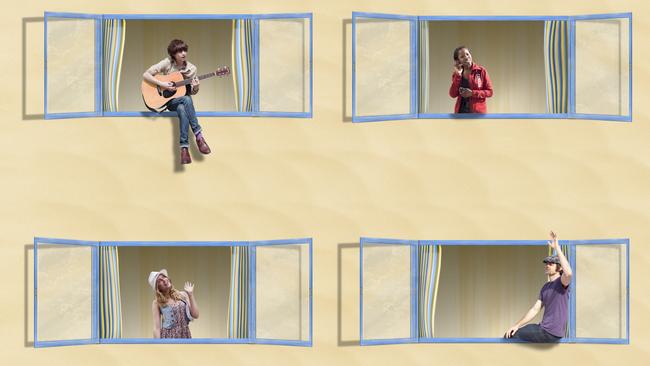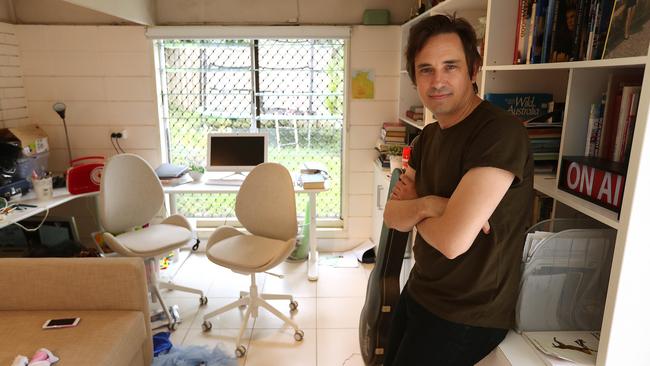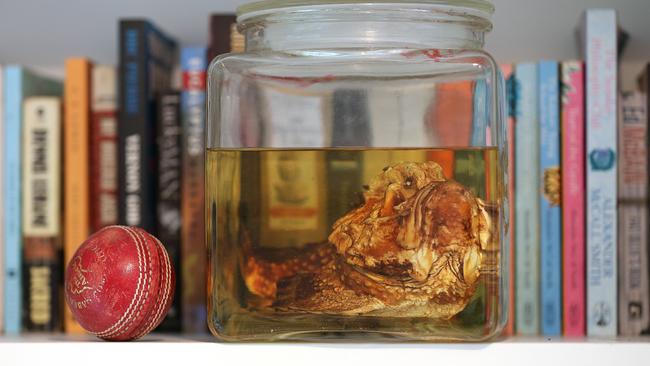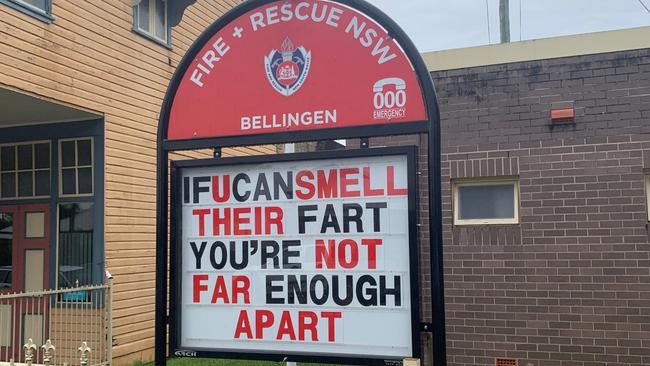Coronavirus: Tales from the bunker
You can’t lock down the human spirit. In a new weekly series, Trent Dalton looks for silver linings... and finds them everywhere.

The way my wife says she loves me chills me to the bone. Two of us making ham and cheese toasties together for a weekday lunch because we do that now since the virus sent us home to this open-ended isolation. Then she says something I haven’t heard her say in 20 years. “I need you,” she says. “I need you three here.”
Me and our two girls, 13 and 11. Here on earth. Not here for any other reason but being alive. That’s how we talk now. Matters of life and death over ham and cheese toasties with chilli jam. Something in her eyes. Love in her heart as deep and real as the dread in her belly. That sure escalated quickly. This all started because I showed her a small burn on my right forearm that I got cooking pancakes for the kids yesterday. She wanted me to put some Betadine on it and dress it with a big square Elastoplast with special antibacterial silver. I told her my theory – baseless, ill-researched – that cuts and abrasions are best left undressed and allowed to heal in the open air. Then she got all cross and said the burn was deeper than I thought and that I might get a staph infection like our friend Glen and find myself in the emergency department of the Royal Brisbane and Women’s Hospital. “And. You. Are. Not. Going. To. Hospital!” And I watch this woman flip those toasties onto our lunch plates and I know for certain in this moment that a vile infectious agent moving among us has made me cherish that woman more than ever before.
Love in the time of COVID-19. That unforgiving virus has rendered every last disagreement, every last marriage squabble we ever had ridiculous and embarrassing and privileged. That nasty leveller that howled at our best-laid plans. That boundless traveller that stole our calm, our job security, our financial security, our joy. That relentless killer that’s coming our way.
I am not going to hospital. Not like those marvels, those miracle workers, the thousands of Australian doctors and nurses and hospital staff who wake up and adjust their tired eyes to the daylight and have their showers and find their work clothes and say goodbye to their loved ones and take all their fear and dread off to the hospital every morning to help mums and dads and sons and daughters fight this thing that’s changed the way we say “I love you”.
That sure escalated quickly. I remember the phone call from my brother. Late January, maybe. The kids were heading back to school. Felt like the worst of the summer from hell was behind us. The floods had receded. The fires were going out. Finally, I said to my wife, the universe can cut the island of Australia some slack. Give us a break for a season or two. I’d been talking to a mate of 30 years, Brian, about how great his wedding in April was going to be; how lucky he was to have a honeymoon booked for Rome. Then I took that call from my brother. His best mate is a virologist, one of the brilliant scientists who helped fight swine flu across Queensland in 2009-10. “This thing coming out of China,” my brother said. “It’s all kinds of bad.” He wasn’t wrong about that.

Can’t sleep. Wake up at 3am again thinking about that Indonesian man I saw on telly. He was squirming flat on his back on a main road at night, coughing hard and trying and failing to suck air into his lungs. People were standing away from him, hundreds of people, and he was just lying there, alone. That’s my guy. My go-to vision in the early hours. Then my mind leaps to that phone call I had with a mate of mine, John Fraser, head of intensive care at St Andrew’s Hospital, Brisbane. John’s team at Brisbane’s Critical Care Research Group is co-ordinating the world’s only data pool for COVID-19 frontline clinicians; it’s using information from 39 hospitals and 200 medical centres across 26 countries and four continents to give real-time, life-saving data to doctors and nurses treating the most at-risk patients.
“This is a condition we’ve never seen before,” John told me. “We’ve never seen what this thing does to the lungs. It’s coming into hospitals around the world and really good doctors are saying, ‘F..k, I don’t know what to do’. Because it’s totally new. No one knows what to do. On top of this, you have the overload of the system. And that’s why you self-isolating is way more important than any doctor in the world. This is your chance to save lives. If you stay at home, you save your granny’s life. That’s how it works. And it’s not really even here yet. This is a tornado and we don’t know where it’s going to land. We’re just trying to get the ground ready.”
Then John makes me think about my mum, who’s in her mid-60s and living alone across town, and then my fried brain leaps to my brother and his family living across the checkpoints of the Queensland-NSW border and then I think about the things I touched through the day – self-serve supermarket touch pads, shopping trolley handles, the door to the post office – and then I think about that nice locksmith Andrew, who recently replaced a faulty handle on our front door. He said he was overworked because everybody was replacing their locks. “Home invasions spike in times of crisis,” he said. “Desperate times. Same thing happened in the GFC. We had stacks of work.”
Gonna be a long year for us overthinkers. I’ll take a thought in the early hours of the morning and turn it upside down and inside out until it has existed so long in my head and in my bones that it’s grown strength. Mutated. Negative thinking’s like a virus. Host thoughts find host thoughts. Each thought mutates and multiplies exponentially and inexplicably until you’re kicking yourself in the dark for doing something so foolish as kissing your daughters goodnight.
Better to stay distracted. Better to go down to the bunker and write some notes about all this. Write my little tales from the bunker.
It’s not really a bunker. It’s just a rumpus room made of concrete blocks underneath my house in the western suburbs of Brisbane. There’s lots of books in the bunker and lots of notepads where I write things like, “Saw our friend Kristi today at school pick-up. Heart as big as this whole suburb, that woman. She pointed at me with the biggest smile and said, ‘When this is all over, I’m giving you the biggest frickin’ hug’.”

In the early mornings it’s just me and Keef down here in the bunker. Keef is my late dad’s pet stonefish, also long-dead. My old man pulled Keef out of a crab pot in Pumicestone Passage, Bribie Island, one hour north of Brisbane. He named him Keef after Keith Richards from the Rolling Stones and kept him in a glass jar of preservation fluid. My old man lived alone battling emphysema for many years and was a master self-isolator but the loneliness often caused him to go, as he put it, “a little bit loopy”. He’d find himself talking to Keef the stonefish some nights. “How ’bout them Broncos, Keef? What’s for dinner, Keef? Ohhh, goodie, minute steak! Nice choice, Keefy!”
Now Keef watches over me from the bunker bookshelf as I write. “What am I writing?” I say to myself. “Good question, Keef.” Something about the fate of humankind hanging in the balance has got me talking to Keef now, too.
Tales from the bunker, Keefy. My notes on the apocalypse, my dear fishy friend. Except I’m not noting all the deaths and the traumas and the economic fallouts and the all-consuming fears. I’m noting the guy who’s been dropping notes in letterboxes in a street in Brisbane’s inner-west.
“Hello, my name is Ben. With the likelihood of increasing social distancing and quarantine at home… I thought it’d be good to get ahead of it and put myself out there for when people need help. I live at the end of the street and usually work as a musician, but with no gigs for possibly a long time I have time on my hands! I can serenade you from outside your door if nothing else.”
I’m noting the 32-year-old freelance copywriter Becky Wass from Cornwall, England, who designed the downloadable postcards that Ben from Brisbane, Australia, used to write his message: “Hello! If you are self-isolating, I can help.”
I’m writing about the girl from JB Hi-Fi in Kedron who I watched search high and low to find the last remaining laptop in stock for my mum, who needed a new computer to work from home. “You don’t know what this means to me,” I said. Then she nodded like she knew exactly what it meant to me.
I’m noting Maureen Hatcher from Brisbane’s west who was getting so troubled by her own negative thinking that she decided to do something overwhelmingly positive and created the “4069 Helping Hands” Facebook page that now boasts more than 1200 members and helps people across her community with pharmacy pick-ups, grocery drop offs, home school tutoring and any other random request. “HELP NEEDED: Family recently returned from overseas in home isolation need about seven dairy-free meals?”
I’m noting kids in our local childcare centre doing paintings and making care packs for the elderly. Musicians giving pop-up piano concerts in cul-de-sacs. People with spare time on their hands joining working groups led by engineers who are repurposing equipment to make more respirators for the ill. People across Australia sitting in their living rooms sewing scrub caps and masks for hospital staff and the public. The dance instructor giving lessons to my daughter via Zoom on a laptop on our back deck. The way my daughter manages her feelings on all this uncertainty. If she’s heard too much car radio talk about the statistics – Italy numbers, China numbers, Australia numbers – she starts playing Cherish by Madonna from her Spotify playlist. There’s something so ridiculous and so beautiful about cutting from pandemic death updates to “Cherish is the word I use to remind me oooooof … your looooove.”
Families reconnecting. People sharing Depression-era recipes. Creating vegie gardens on a Saturday afternoon. Board games on Sunday. School in the dining room on Monday. Those looks we’re all sharing in car parks. Those “hang in there” looks we’re sharing with strangers. So much understanding and conversation transferred in a single look. Isn’t this just the most incomprehensible nightmare? It hasn’t just landed at your doorstep. It’s landed in your lap. It’s as close to you as your fingertips. I hear you. I feel you. Hang in there, stranger.

Why does any of this matter? Good question, Keef. It matters because there is a light that never goes out and I know it might sound cheesy as hell but I can see it shinin’, Keefy. Something extraordinary is happening. Something special spreading across the world. Light finds light. Goodwill and kindness and that burning and inextinguishable human light is infectious and we’re all far more vulnerable to it than that cheap and nasty C-word of a disease.
I’m noting the humour. Humans are so smart and black and funny in the darkest hours. All those memes and all those text message gags that make all the difference; that make us feel so together. Together alone. Fireys making gags on their station signs: “If you can smell their fart, you’re not far enough apart.”
I’m noting a text that comes through from my old mate Brian, and the way, for some inexplicable reason, there’s power in it and resilience and succour. The poor blighter and his beautiful fiancee have watched their April wedding and honeymoon plans – not to mention enough cash to buy a truckload of black market hand sanitiser – disintegrate through a series of night-time prime ministerial press conferences. We were trying to organise a buck’s gathering to lift his spirits. A simple fishing trip, at first. Then maybe just a handful of blokes on a shoreline, standing three metres apart. But that fell apart, too, soon enough, and Brian finally held his hands up to COVID-19 with a text to all concerned, a screed of note-perfect Australian piss-take resilience mixed with unexpected concluding inspiration: “So, as it stands with the shit show, I’m holding near $30K in damnable credits that I feel are very ephemeral with imminent bankruptcies. Be that as it may, we shall not go gentle into that good night. I demand a rematch where we reset, go bloody fishing and get drunk when we can. It’s our patriotic duty to get the economy started again. And, if anybody needs anything, my home is open as the slippery slope proceeds. One of my staff lost his home today through typical Machiavellian shite, and he may be coming here to stay. Rage, rage against the dying of the light. F..k me. I’m getting a rum.”
The light won’t die, Keef. It will flicker inside us all and it will spread like wildfire and we don’t have to put this one out. We don’t have to call on those glorious fireys for this one. We can let this kind of fire burn ’til Christmas.
Tales from the bunker, Keef. Maybe I can share some of my tales and maybe some of those people out there in their own bunkers can share their tales with me?
I wonder if you’d do that for me, dear reader. Consider this a callout. Could you let me know how you’re going out there? Will you let me tell your bunker tales? How are you coping with this thing? Is there someone you think deserves a shout-out? Someone you want to give thanks to. Have you been diagnosed with this awful thing? Is there someone you’re worried about? Someone beautiful who you’ve lost? Is there someone who deserves a line or two in my ongoing tales from the bunker? I want to hear from you. Send me your own bunker tales and I’ll try to send you mine every week for who knows how long in these very pages. Maybe we can even get through this thing together. Together alone. If you feel the need to communicate with someone, you could do worse than some bloke in a bunker in Brisbane who talks to dead stonefish before dawn.
But no more talking now, Keef, because the kids are hopping out of bed upstairs and school’s about to start in the living room. The morning birds are squawking in the trees across the western suburbs. The autumn air is crisp and promising and the light is spreading across another day. The light, the burning and invincible light.
To share your own bunker tales with Trent Dalton, email him at thebunkertales@gmail.com




To join the conversation, please log in. Don't have an account? Register
Join the conversation, you are commenting as Logout